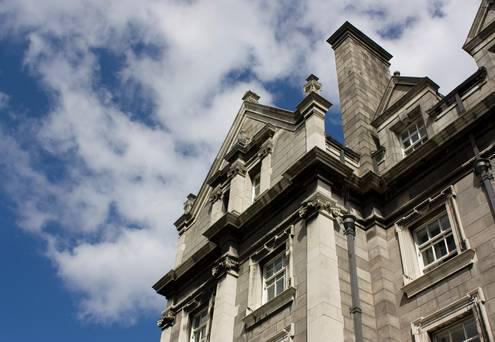|
Revealed: How Bodies of infants used for university research
By Eilish O'regan Health
Irish Independent
June 25, 2014
http://www.independent.ie/irish-news/news/revealed-how-bodies-of-infants-used-for-university-research-30382242.html
 |
| Trinity College Dublin received remains from St Kevin’s Hospital, St Patrick’s Home, Cork St Hospital and St Clare’s Home, Dublin |
THE remains of 474 infants – who died in mother-and-baby homes and hospitals – were used for research and doctors' training in Irish universities for a quarter of a century, the Irish Independent has learned.
New figures reveal the full extent of the practice of doctors using "unclaimed bodies" for anatomical study up until the mid-1960s with no evidence of consent being obtained.
There were 474 unclaimed infant remains transferred to the medical schools at four universities from 1940-1965 for the "study of the anatomy and the structure of the human body".
advertisement
The latest revelations come in the wake of renewed controversy over standards of care in the mother-and-baby homes across the country following the discovery of mass infant deaths at St Mary's in Tuam, Co Galway.
The baby remains were transferred to UCD, Trinity College Dublin, the Royal College of Surgeons Dublin, and NUI Galway until a campaign by the college professors got under way to encourage voluntary donation.
The infant remains transferred to the medical school in NUI Galway came from two Galway hospitals as opposed to directly from mother-and-baby homes, according to records. It is unclear what the circumstances of the deceased babies' parents were. The Central Hospital in Galway had a TB ward and was replaced by the Regional Hospital Galway in the early 1950s.
Inquiries by the Irish Independent have now led the four colleges to set up helplines for the first time to provide information, where it is available, to any individuals and families who want details about the remains of relatives.
In a statement, the anatomical committee of Irish medical schools – representing anatomy departments – said in the first half of the last century, “unclaimed bodies” could be transferred to these departments.
The committee said: “The practice of transferring remains from institutional settings to anatomy departments was in accordance with the Anatomy Act of 1832.”
This allowed individuals to donate their body to research while a next-of-kin or a person acting in loco parentis could also volunteer the remains.
“Transfers were recorded by anatomy departments. Records show that between the years 1940-1965, 474 unclaimed infant remains were transferred to anatomy departments. The purpose was for the study of anatomy, the study of the structure of the human body.”
The committee said the practice of transferring the unclaimed infant remains ended in the mid-1960s, following a public campaign by a group of anatomy professors to encourage public donation.
“Practices have long been in place to ensure absolute procedural sensitivity towards donors and families.” All donations now have to be made with informed consent.
The new information reveals that practice was at its height in the 1940s when 406 infant remains were given to these departments. UCD received 234 bodies, followed by the Royal College of Surgeons with 72.
UCD received 249 infant remains, the highest of all the departments over the quarter of a century. These remains came from the Dublin Union, St Kevin’s Hospital, Temple St /Regina Coeli and St Patrick’s Home. Trinity College Dublin received 103 remains and ended the practice in 1962. The remains came from St Kevin’s Hospital, St Patrick’s Home, Cork St Hospital and St Clare’s Home.
The Royal College of Surgeons also stopped taking the remains in 1962, having been supplied by Dublin Union, St Kevin’s Hospital and St Patrick’s Home. NUI Galway received 35 bodies and 27 of these were obtained between 1960 and 1964. The remains came from Central Hospital Galway and Regional Hospital Galway.
The practice is expected to form part of the Commission of Investigation, which is to be set up by the Government. An initial review report, which will help determine the scope of the probe, is due early next week.
A spokeswoman for the Department of Health said yesterday it was involved in a high-level, cross-departmental review committee, which is examining all issues before drawing up of terms of reference.
“This high-level committee will report to Government before the end of June 2014,” she said. She said the Minister for Children and Youth Affairs Charles Flanagan confirmed that the scope of this investigation will go beyond Tuam, and “will deal with other related matters regarding the operation of these homes”.
The department spokeswoman said the donation of bodies for anatomical examination is still regulated by the Anatomy Act 1832.
“This Act provides that a person practising anatomy must obtain a licence and also provides for the appointment of inspectors to inspect places where the practice of anatomy is carried out.
The Department of Health is developing the Human Tissue Bill, which will put in place new arrangements in relation to the donation of bodies to anatomy schools.
Individuals and families who wish to enquire about the transferred remains of past family members are invited to contact the following: University College Dublin – telephone 01 716 6617; Royal College of Surgeons – telephone 01 402 2260 or emailanatomyenquiries@rcsi.ie; Trinity College Dublin – telephone 01 896 4577 or
email: anatomy@tcd.ie;
NUI Galway – telephone 091 49 3361 or email info@nuigalway.ie.
Irish Independent
|
